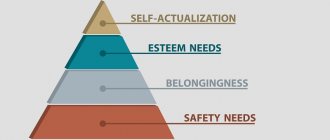The ability to give feedback is one of the components of effective communication. Often it is necessary to clearly explain why an idea is not suitable, or to identify shortcomings in a colleague’s work. However, criticism can become destructive and, as a result, worsen the relationship with the interlocutor and demotivate him. Together with the director of the Center for Corporate Training and Development of T&R Alexandra Zhirnovskaya, we talk about the principles of constructive criticism and how to perceive it.
If they criticize you
What to do when you hear accusations, condemnations and claims addressed to you? If this has already become the norm in your life and those around you constantly allow themselves to express negative assessments of you, then the first thing you should find out is whether you yourself are giving them carte blanche in this. The article “How to Stop Being a Victim” will help you change your behavior.
In addition, you need to learn to defend your actions, decisions and choices. Remember, many people criticize not because they really want to help you, but simply express their negative opinion, are jealous, want to take revenge for something or hurt you. The article “How to Defend Your Opinion” will tell you how not to hesitate and boldly act on your own.
It is important to learn to distinguish between real feedback and criticism. When a person really wants to help you, he will definitely praise and point out your strengths, suggest several options on how to correct the situation in the future and prevent such mistakes
How often do you allow yourself to evaluate other people? How often do you hear condemnation addressed to you?
Don’t give ready-made instructions, let the person solve the problem himself
This one is more appropriate for personal relationships. We all care about our loved ones, but the expression “choking with care” did not appear out of nowhere. The fact that you simply talk about the importance of some moment in the relationship will work better than if you immediately tell “how to” and give instructions.
We have already described how such “rescue” harms relationships, we have already described in
the material about the Karpman triangle.
Firstly, a ready-made solution may not work. Even the most rational person cannot know and predict everything in the world and is not immersed in the problem to the same extent as the recipient of the advice. This means that it cannot offer a scenario of productive behavior that takes into account all factors.
Secondly, this approach seems to hint that you do not respect the other person’s right to make their own informed choice. The first step in such cases is to express your vision of the situation. This may seem like over-delicacy, but if a person cares about you and your feelings, he is more likely to understand how his actions affect you. So expressing your doubts and arguments in favor of some strategy is much more useful than directively throwing around dogmas.
Necessary conditions for competent communication
Let's look together at the mandatory principles of constructive dialogue that will help you come to the right decision, allow you not to waste time, teach you to hear your partner and lead to success.
Time frame. The most important thing in solving a problem is its timeliness. People often resort to talking about the past: you didn’t do your homework yesterday; why didn't you call me last week; it should have been ready the day before yesterday
Such requests do not lead to a solution to the problem; they call on a person to make excuses, force them to lie and get out.
Remember - the past cannot be changed. The deed done yesterday will remain there forever. You can influence the present and the future. Therefore, requests should relate to these times.
Talking about the past will be relevant if you are sorting out mistakes to eliminate them in the future. In order for your child to do his homework on time, you need to understand what problem he is facing. He doesn't understand the task, he doesn't have time left due to other activities, he just forgot about the task. And here you decide together how to help your child avoid such a situation in the future.
Wrong choice of interlocutor.
A wife complains to her husband that their child broke a flower pot again. The husband listens silently, but does not offer any options, because, to put it mildly, he is not concerned about this issue at all. In this case, the woman acts destructively.
She should have addressed the child himself, who is a direct participant in her complaint. It is with the child that she can find a solution to the problem.
Subordinates constantly discuss management decisions among themselves. There is no kitchen corner to have lunch; the salary could be divided into two parts; uncomfortable chairs in the office and so on. It would be more constructive to address such questions to management, with a specific proposal.
Using facts.
How often in conversation do we hear such phrases: because I said so; it will be right; you don't understand anything about this matter. These are just empty phrases that do not support any argument. A person does not always know how to correctly use the available facts.
Why is it better to send a child to this kindergarten and not to this group? Because I think so, the wife answers. And what she means by this is completely unclear. Is the kindergarten closer to home and we won’t spend a lot of time on the road? Does this institution have more qualified teachers? Better nutrition?
We solve the problem, not change the interlocutor.
In psychology, there is such a phenomenon as an attempt to change those around you to suit yourself. You should try to get rid of this as early as possible. If you one day realize that you cannot change another person, then you will instantly get rid of a huge number of problems.
You are faced with a specific task. The child does not do his homework. You do not need to break the child and re-educate him, but to achieve a solution to the problem. If he himself is having a hard time, then he needs help. If he doesn't have enough time, then redo his extracurricular schedule. Solve the problem, don't change your interlocutor.
I offer you a list of modern books that will perfectly help expand your knowledge in the field of constructive communication.
How often do you encounter destructive behavior from your interlocutor? Why can't people hear each other? How can this be avoided? What methods do you resort to to move the conversation in a constructive direction?
Learn to speak correctly!
Communication with people occupies an important place in our lives. Without it, love and family relationships, friendships, work, business would not be possible.
As a rule, people who master the skill of constructive communication achieve great success in their personal and professional lives. But how can you learn to communicate constructively? What does the concept of “constructive conversation” even mean? You can find answers to these and other questions in our article.
Perfection doesn't exist
We are all living people who have feelings and get upset when these feelings are neglected. Of course, for effective communication you need not only the right message, but also an adequate reaction, but remember that the adequate reaction to rudeness and insults is to ignore or respond to insults.
Caring, combined with corrections and relevant comments, gives an excellent result: in addition to ideas on how to do the job better, a person understands that he is not treated as a function, but is truly valued and cherished (remember the sandwich technique). Admitting your own mistakes can make even a difficult conversation humane: you will demonstrate that you do not consider yourself to be the only one right and that mistakes are an integral, useful part of the work process and they happen to everyone.
Remember - any task, even in your opinion a simple one, is given differently to different people. For example: a person who has never written an ad may indicate unnecessary information in it, but not the necessary information. But this does not mean that a beginner is in principle unable to do this - he just needs time to learn. By showing that you understand why an employee or partner is hesitant in a new business, you gain credibility and show that your goal is to help, not to hurt.
Principles of constructive criticism
Objectivity. Express your opinion, but do not claim that it is the only correct one. Specificity
Focus on specific points rather than on the entire work. Reasoning. Show what your assessment is based on and justify your opinion. Experience and practice
Examples from personal life are very illustrative. Tell us how you avoided mistakes or corrected them. Professionalism. If you are well versed in the issue you are criticizing, then people will listen to you. Otherwise, you risk being branded an amateur. No personalization. Criticize the work, not the person, show respect for your opponent. Focus on the positives. When pointing out the shortcomings of the work, do not forget to talk about its advantages.
A Guide to Good Criticism
Ekaterina Sigitova, psychotherapist
I should have written this manual a long time ago. And I literally spent the last year getting ready, every time I came across phrases like: “well, you wrote this, so you should be ready for criticism,” “you do not take criticism adequately,” “you are offended by well-deserved criticism,” “you, Apparently, you can’t criticize, you can only praise”, “I’m just giving you feedback”, “I want to help you, and you!”, “This is the Internet, baby.” And so on and so forth.
I can't be silent anymore. Writing.
People! Thank you very much for being so caring. It’s incredibly cool when someone is so concerned about others that they spare no time and knowledge for comments and criticism. This is very valuable, and it is really important. Please take care of this indifference in yourself.
But regarding the fact that the above is precisely criticism, someone cruelly deceived you.
What we call criticism and is seasoned with all these kinds of sauces, in fact it is not even close to it. Unfortunately, we are not taught to criticize all of us - neither in schools, nor anywhere else at all (except perhaps in a literary university). But we are all taught to treat ourselves and others harshly and even aggressively. Therefore, under the guise of criticism, many good people try to push each other aggression, grievances, complaints, discomfort, unsolicited advice, a picture, a basket, a cardboard and a small dog. Which often hurts each other undeservedly. And real criticism, which would stimulate development - and which is really very necessary! - in the end, very, very little. You literally have to search with flashlights and a shovel, and it’s doubtful that you’ll find it.
Let's talk about criticism, about how to do well and how, if possible, not to do badly - and try to change our world for the better. A? A?
So what is criticism? This is an analysis, evaluation and analysis of any work, phenomenon or product (and even a person), indicating opportunities for improvement.
What is the purpose of criticism? Oddly enough, but to help its object improve itself or its creation, stimulate development. Correct criticism evokes good feelings and positively motivates, because the object of criticism understands: he is not alone, they are helping him, they are worried about the quality of his work from a “shoulder to shoulder” position.
A person of Russian culture usually wants not only to argue with the previous paragraph, but to smash it to smithereens, because it just doesn’t fit in his head. And there are reasons for this: the fact is, dear readers, that you and I grew up in very harsh conditions, in which there were few carrots, and much more sticks than we would like. I don’t even mean families so much (although they do too), but the conditions in general, the environment that has surrounded us for many years. This environment is characterized by massive “incontinence of negative affect,” that is, the absolute normality of public reactions of any degree of harshness to everything, without thinking about whether they are appropriate and adequate. If you Google the word “criticism” (in Russian), the results will consist almost entirely of texts about destructive criticism - about accusations, dissatisfaction, complaints and anger. This is exactly how this word and this phenomenon are perceived in our culture.
For those who don’t want to learn, but want to continue doing what’s convenient, I suggest closing the page right from this point, because I won’t be able to help you 
And with those who remain, let's look at the two most common mistakes that people of our mentality make in the process of criticism.
1) Firstly, they give out their opinion without asking
Course N.I. KOZLOV “ EFFECTIVE INFLUENCE ” The course contains 6 video lessons. View >>
The idea of responding only upon request (to anything) is also extremely difficult for a person of our mentality to comprehend. The “default” checkboxes are set in our heads so that any manifestation of any person in the environment automatically means that everyone passing by has the undeniable right to evaluate these manifestations, condemn them, say something about them, and somehow react to the best of their ability. strength and intelligence. And expect that they will listen to him (and even better, if they take note and thank him). Also, by default, the “get offended, angry and speak out if you don’t want to listen (accept, thank)” checkbox is checked.
IT IS ALMOST NEVER ABLE TO EXPLAIN THAT IT'S ACTUALLY THE OVERSEAS THING!
Even now I’m not sure that I’ll be able to finish shouting. But, you see, I'm trying. There is still hope.
People! If there was no demand in the environment for your reactions, then you simply should not have any urge to “criticize”. And even more so, there should be no resentment that someone is not interested in your opinion and you as their source. You can have feelings, thoughts and reactions in response to any stimulus. But they are only yours, and you have to deal with them. If for some reason they immediately have a vector towards feedback to the source of the stimulus, then this is unhealthy garbage, on many counts at once. Work with unhealthy crap, please, and don’t use it on others in vain. Beating won't help.
2) Secondly, people consider anything other than criticism to be criticism
The main reason, as I already mentioned, is the harsh environment in which we grew up and the distortions of perception associated with it. Due to distortions, we simply take as criticism everything negative in a row - both addressed to us and from ourselves.
Here I want to give examples, because with them it is immediately clear what is meant.
Inappropriate I-Messages
Examples: “I don’t like it, it didn’t help me, it doesn’t provide me with any information, it doesn’t apply to me, I’m not like that, etc.”
Why this is not a criticism:
You share some of your emotions or thoughts: for example, violated expectations, frustration about wasted time, insight, information about yourself, etc. But in 95% of cases a person does not need this, it is uninteresting and useless, because it is about you, and not about him, and not about his creation. It turns out a little like a joke - “I came to tell you not to count on me.”
There is one exception: if you are a very typical representative of the audience for whom all this is intended, then your emotions are important and need to be taken into account. Unfortunately, 9 out of 10 “critics” are not of interest in this regard either, which, of course, can be a shame, because you want to talk about yourself.
How does a person feel when he is “criticized” in this way:
Most often, there is bewilderment: who are you anyway? But he can worry and lose motivation if it is important for him to please everyone.
How to turn it into correct criticism:
Add why you think information specifically about your emotions and reactions may be important. If it is impossible to add something like this, don’t say anything.
Primitive negative assessment
Examples: “Bad, terrible, some kind of nonsense, nonsense, nonsense, sucks, well, bullshit, this is complete nonsense, etc.”
Why this is not a criticism:
Primitive means simple, of the very first level without tension. There is no benefit from this assessment, because it is subjective and too simple, which means it cannot be “included in statistics” and cannot be a platform for improvement (nothing is specified). The exception described above also applies here: if you are a very typical representative of the audience, or, for example, the boss of the person being criticized, then your opinion is important. As you might guess, most of the “critics” are neither here nor there, but are happy to evaluate everything around them without bothering too much.
How does a person feel when he is “criticized” in this way:
Resentment, indifference, fatigue - depending on sensitivity to primitive assessments.
How to turn it into correct criticism:
Make it more complicated (for this you will have to strain and reflect on your sensations, understand what exactly caused them). Explain why your impressions are important (for example, you are the target audience). If your impressions are not important in any way, but are simply bursting at you, don’t say anything.
Getting personal
Examples: all personal insults, accusations, mentions of any information from the personal history of the object of “criticism”, references to the character of the object, assessment of his reaction to all this, etc.
Why this is not a criticism:
And again it must be said that this point is the key difference between the Russian-speaking space (unfortunately). “Shame on the lousy gardener,” as a result of the question about the piano, remember? That's exactly it. We generally do not know how to consider an event, opinion or product in isolation from the personality of the creator. It sincerely seems to us that everything is connected, which means we have the right to discuss the personality, as if it were he who was being assessed. In addition, very often the transition to personality is used as a reason to nullify or thoroughly devalue what a person has done, or to bite him more painfully by finding vulnerable spots. Nobody can change their personality, and especially not everyone wants to do it, so why drag it in at all?
I remembered a typical example - accusing feminists of trauma as the reason for their position, as if having a traumatic experience is something shameful and discrediting the position itself. Very few people can discuss feminism in isolation from the personalities of feminists.
How does a person feel when he is “criticized” in this way:
The range is wide, depending on the background: surprise, confusion, irritation, anger, shame, powerlessness (you can’t change yourself, which means you will remain a target, so perhaps it’s better to do nothing).
How to turn it into correct criticism:
Very difficult, but possible. Remove the personality altogether and consider the product or process in isolation from it. If it doesn’t work out at all, imagine that your closest friend or girlfriend did it, i.e. all the previous connections with the person that scratched you have stopped working. Then check if you still want to say something.
Aggression
Examples: direct aggression - insults, rudeness, indirect - sarcastic and caustic remarks, passive aggression - “well, now what,” etc.
Why this is not a criticism:
Everything is simple here. Aggressive release under the guise of criticism is an attempt to react to one’s anger, envy, discomfort and other emotions through an attack on the object. Emotions can be caused by both the person himself and his creation. Also, emotions may not have anything to do with anything “criticized.” It’s easy to guess that aggression does not contribute to any improvement or help, but what it does well is create a healthy desire to defend itself or attack in response.
How does a person feel when he is “criticized” in this way:
Depends on how much he can separate himself from what is being “criticized.” If he separates well, he will feel regret, irritation, surprise. If it’s bad, he will feel like he’s being attacked, go on the defensive and become demotivated.
How to turn it into correct criticism:
Stop and take a step back. Try to understand where you became angry, and how your personal life history (or history of relationships with this genre, person, industry) contributed to this anger. If a place is found, provide feedback in the format “At that moment... I felt angry because... I think it’s important for you to know this because...”. If the place is not found, leave everyone alone and deal further only with yourself, because... It is in your best interest to monitor random aggression triggers.
Hyper-expert presentations
Examples: unsolicited instructions and lectures on how to do things, theatrical reproaches for shortcomings, hints veiled as questions, familiarity, condescension, instructive intonations, attempts to use manipulation and “training” (negative and positive reinforcement)
Why this is not a criticism:
First, let me clarify that for me the word “expertise” does not have a negative meaning. We are all experts in something, and often share our knowledge with each other, without any hierarchy. This point is about redundancy. Hyper-expertise is a pleasant scratching of your FSN, because such “criticism” itself emphasizes that you know everything much better. In some cases, this is also an attempt to compete or dominate (i.e. it contains aggression). Your message may well include valuable comments (there are real experts), but everything presented in this form will not reach the goal, because any person will instantly be distracted by the cover. Except when he's a Buddhist, perhaps.
As an example, I would like to cite the usual (and in most cases unnecessary) position of hyper-expertise among men in relation to women. For any questions. It even has its own name – mansplaining.
How does a person feel when he is “criticized” in this way:
Depends on the severity of his narcissistic part. If it is expressed strongly, then he will be hurt, perhaps wounded, because he will feel worse than you and feel shame. If it is weakly expressed, he will not notice, he will laugh or be irritated.
How to turn it into correct criticism:
Leave all content as is. Reflect on your true motives, smooth out your inflated Ego and completely remove excess expertise. If this is difficult, then imagine that you are doing a joint project with a colleague, and both are responsible and worried about the result (but it fell to him to report).
The requirement of perfection
Examples: “the wrong words were used, the color is wrong, it should have been done differently, this little thing spoils everything, is it really possible, you’re doing everything wrong, you didn’t take this into account, it’s too emotional,” and everything else from the series “ You’re standing wrong, you’re whistling wrong.”
Why this is not a criticism:
Usually this is the viewer's perfectionism. Nitpicking tends to focus on specific little things that are so blatantly “wrong” that the perfectionist becomes almost physically ill. Therefore, their correction seems more important than the main object itself, and the emphasis shifts. In fact, this is a requirement for ideality, and ideality from the point of view of a specific outsider. In order to achieve it, another person needs to live in your head and know how to do it your way. Why does he need this? Most often, for no reason, because it’s not a fact that you think it’s better. Although you can hurt with such claims - we have an incredibly narcissistic world, where many are poisoned by fantasies about ideal products and the inability to support themselves through mistakes.
How does a person feel when he is “criticized” in this way:
Depends on the severity of his narcissistic and also obsessive parts (terrible words!). If they are expressed strongly, then he will be “infected” by you and will feel that everything is lost, because ideality has not been achieved and he did not please you. If they are weakly expressed, they will not be affected. Perhaps he will even try to calm you down, because watching the torment of a perfectionist is quite difficult.
How to turn it into correct criticism:
Perfectionism is very difficult to fight because its basis is painful: once something was not done well enough, and the consequences were too expensive. This trap may then work throughout your life, but other people, of course, have nothing to do with it. So for criticism it is better to frame this as I-messages: “I feel that it is very important to change here.. and here... Because...”. True, we must remember point 1 here - does the other person need any information about you and how exactly you need to do it your way? It also helps to honestly answer the question: could you, being so smart, really do what someone else did better? And at the same time? The usual answer is “no,” if only because another person’s product is what it is, and yet you only have spasms from its imperfection. Then it might be better not to say anything.
Depreciation
Examples: “why is this necessary at all, you don’t have anything to do, but in Soviet times they lived without it and nothing, it’s pointless, look at how much time you wasted,” etc.
Why this is not a criticism:
Oh, this is the main bane of all those criticized, because the message contained in the devaluing phrase is “you haven’t really done anything.” It's hard to think of anything more destructive. This cannot be criticism by definition, since it nullifies the very space for criticism. Why you want to nullify other people’s results is a big question: sometimes it’s a sincere opinion “it would be better if this hadn’t happened,” sometimes it’s disguised aggression, sometimes it’s competition, etc. In the overwhelming majority of cases, this is also an obvious untruth, because if the result were not really worth anything, there would be nothing to reset. Therefore, people who use devaluation fall into their own trap - since the energy they expended clearly indicates the level of significance of the object of “criticism” for them.
How does a person feel when he is “criticized” in this way:
Devaluation is a narcissistic defense. If the person you criticize has a strong narcissistic side, then he will either become infected (that is, begin to experience his own insignificance) or get hurt.
How to turn it into correct criticism:
This point is a no-no. It’s best not to say anything, but to figure out why you are so drawn to turn something into zero and bite someone else’s Ego.
Containment requirement
Containing is the ability to process emotions without suppression, a kind of digestion that makes them bearable.
Examples: “Loud” (in terms of intensity) messages about your feelings and sensations with detail (“I’m going to throw up”), reproaches for the occurrence of these feelings, presenting yourself as your victim, demonstrating “wounds” and problems that arose because of you, indistinct shouts (“aaaah oooooo frrrr ah-yay-yay fucked up!”), etc.
Why this is not a criticism:
Let me clarify that I'm not talking about actual relationships where someone is hurt, just the kinds of human reactions to ordinary, simple things that shouldn't hurt. An active demand for containment, in the absence of a relationship, is simply an attempt to extinguish your burning fire on another person..., because either 1) there is a conviction that he is to blame for the fire and should help extinguish it, or 2) you want to punish him for your discomfort from the burning sensation (which you don’t want to deal with yourself). The mechanism works regardless of the true causes of the fire, which can be (and most often are) deeply personal. As my colleague Polina Gaverdovskaya says, where he grabbed it, he shit himself there, okay, if he managed to take off his pants. It is curious that often “victims” spend as much energy on this item as not all of us have (and this is one of the signs that there is no need to worry about them).
How does a person feel when he is “criticized” in this way:
Some people feel bewildered because, in fact, for some reason they are being poked at with something to the left and demanded to do something about it. Others (hyper-responsible, or prone to feelings of guilt) can be induced and seriously begin to contain.
How to turn it into correct criticism:
Remove the shade of the requirement and file it in the form of a “bug report”: “I got the feeling that... Perhaps I’m not the only one who feels this way, and if this was not your goal, then take note.” It can also be useful to figure out for yourself why you have the need or desire to convey your feelings to someone else. If this is increased vulnerability and inability to deal with discomfort, then after all, these are not the problems of others, and this must be taken into account.
Far-reaching conclusions
Examples: “Now everything is lost; you did this because...; it discredits the whole idea; all this is not without reason”; as well as literary techniques such as hyperbolization, pseudological calculations, etc.
Why this is not a criticism:
Because these are personal reflections, as a rule, deeply subjective (although people who agree with them may group). From the outside, it most often resembles paranoia, a glitch in thinking, or a global conspiracy theory, because the author usually cannot prove his conclusion. More precisely, he thinks that he can, but he gets tangled in his legs and falls. By definition, such shouts cannot contribute to any improvement - everything happens in the “critic”’s head, so you are powerless here.
How does a person feel when he is “criticized” in this way:
Irritation, anger, bewilderment, indifference - depending on sensitivity to the reactions of others. You can even make stable people laugh at this 
How to turn it into correct criticism:
If you are inclined to do this, try to self-criticize it and find the “weak link” in your reasoning before expressing your judgment. A good technique for this is to imagine that you need to refute your own position, what arguments do you use? Often after this internal dispute it turns out that there is nothing to say, since the indisputable turned out to be controversial. If you still have something to say, present it as a thought and ask for advice: “For some reason it seems to me that... What do you think?”
Tired? It's okay, it's over soon. We have looked at how not to criticize and why. Now let's move on to the most important thing - how to criticize. How to formulate your comments in such a way as not to hurt, demotivate, or insult, but to support and stimulate.
Signs of good criticism:
- it comes from a position “shoulder to shoulder with the author”;
- it is respectful, that is, it takes into account the work of another person and/or the result of this work;
- it motivates change;
- it generates insights about how something can be improved;
- it doesn't hurt self-esteem. Ideally, it doesn’t concern her at all, because there can be no need to hurt someone else’s Ego in order to get her point across.
How to criticize:
- Start with something positive and give him quality praise. It is important to do this sincerely, that is, to really find the good in the subject of criticism, and write in detail why you think it is important. False praise is easy to spot;
- Put all your negative emotions aside so as not to trigger your defenses. Do not suppress feelings at all - just put them aside for a while, as they will bother you;
- If your criticism is verbal, use warm reinforcement, positive body language, and a smile. Let your goodwill be felt. If written - the same, within the capabilities of printed text;
- When you get down to the actual points of comment, use I-messages instead of demonstrative sentences: instead of “you are wrong” - “I disagree.” This way you will avoid an accusatory tone;
- Be as precise and detailed as possible in describing the essence, what needs to be changed and improved. The more details, the better;
- Focus on the behavior/product/creation, not the person. This way you will save him from the feeling “I’m somehow wrong, I’d rather go and lie in the bushes”;
- Try to enter into the position of the person being criticized, to sincerely try on the skin of someone who has already done a good job - and not to broadcast how bad everything is from your position. Sometimes after this it becomes clear that some points of your criticism are easier to voice than to do, given everything that he has already taken into account. And some need to be done differently than you think;
- Don't say too much at once. Limit yourself to two or three points, the rest can be added if there is a dialogue;
- Give us ready-made solutions, i.e. tips on the process that you can immediately take and use. If there are no ready ones, come up with at least one, even if it’s raw. This will make it easier for the person being criticized;
- Be sure to end with something positive, and again, praise with quality and detail. The better you stroke at the beginning and end, the better what is in the middle will be perceived.
That's all. Those who have read this far are well done and heroes! I would like to wish one last thing to all the heroes.
Please remember: the purpose of your intervention is to help someone improve, to fix a problem.
You don't relax with criticism, you don't work off your stress, you don't scratch your Ego. If you do this, stop and think whether you really have valid points, or whether you just need to talk to someone. If you REALLY want to help, make sure that your feedback contains exactly this message. It can be very difficult to separate the main from the secondary, but the best criticism is precisely the most conscious and most carefully thought out. For the person being criticized, it is also the most convenient, because it can be immediately put to work. With the help of such criticism, problems and ways to solve them are visible very clearly. At the same time, the person being criticized does not receive a “free bonus” in the form of frustration, demotivation and a feeling of his own wrongness.
Take care of each other - both those whom you criticize (because there are too few people in the world who do at least something), and those who criticize (because there are also, in general, few people who really care).
How to distinguish constructive criticism from envy and destructive criticism
Anastasia Teteruk, psychologist, HR specialist. Photo: from personal archive
Envy hides the lack of something in the criticizing person that the person being criticized has. With a negative assessment, a person tries to redirect his negative emotions that arise as a result of envy. By doing this he is trying to somehow reduce internal tension. In destructive criticism there is an intention to humiliate a person and devalue his work. The motives are different: competition, self-affirmation, human selfishness.
Constructive criticism specifically identifies an error, supported by obvious arguments: “Your report is superficial and incomplete. There are not enough numbers and examples in the first and second sections, please add more. You can take your colleague’s report as a sample.” In addition, often a person is given some kind of advice or recommendation “how to do it” or “how not to do it.”
In envy and destructive criticism, on the contrary, everything is very vague, generalized and subjective: “Your report is superficial and incomplete. I do not like him. Your colleagues are great. The reports are always done well, unlike you.”
In constructive criticism, the emphasis is on the work: either its process or its result is evaluated. For example, “you are not preparing the report as needed, you are preparing the tables incorrectly” or “the report is not compiled correctly, there are not enough numbers.”
In envy and destructive criticism there is an emphasis on the personality of the person being criticized. For example, “You don’t know how to do reports. It’s all because of your absent-mindedness and irresponsibility.”
Why criticize
At my school, the biology teacher read out all the mistakes after the test to the class. Everyone laughed, except the one whose mistakes were read out. I don’t know what the teacher was thinking, but it’s unlikely that she hoped for the therapeutic effect of laughter. The logic here is this: the person made a mistake → we need to show how much he is wrong → we need to crush his work → haha, how could you write such nonsense.
I thought only teachers bullied children, but it turned out that many people do this. Even in large and smart companies they mock other people's mistakes.
Other story. Once in graduate school, I brought my first article to my supervisor. The article was terrible, and I was ready to endure humiliation. There wasn't a whole lot of red marks left in the draft, but I was so pleased that I couldn't wait to get on the computer and start rewriting. My professor didn't have any magic or inspirational speeches. He simply showed me what I had already done well and how to do it even better.
The difference is how the teacher and the leader understood the criticism. The first one believed that it was necessary to shame, the second that it was necessary to help. Both options help correct errors, but the second method is more forward-thinking. And generally speaking. Offending people is bad.
How to respond to criticism?
First of all, I want to note a very important point:
A literate person's response to criticism should begin with determining the type of criticism, that is, whether it is constructive or destructive. The signs by which this can be determined are described above. So, let's look at how to respond to criticism.
1. Don't lose self-esteem and faith in yourself. Even constructive criticism should under no circumstances become a reason to lower your own self-esteem and lose confidence in your own abilities.
2. Separate emotions from useful advice and recommendations. Often both constructive and destructive criticism can be emotional to one degree or another. However, really useful comments, advice and recommendations can be “hidden” between emotions. When listening to criticism, immediately separate all emotions and ignore them.
But on the contrary, focus on constructive comments, advice and recommendations
3. Don't respond to criticism right away. The response to criticism must be thoughtful. Often a person who is criticized, especially if the criticism is emotional and destructive, also falls under the power of emotions, responds in the same spirit, criticism develops into a quarrel, and relationships deteriorate. Who benefits from this? Nobody. Therefore, it is better to silently listen to criticism, and if it requires an answer, take a break to think about it.
4. Use constructive criticism to help. Since constructive criticism is carried out with the aim of providing assistance, take advantage of this, use it for your own benefit. That is, analyze and draw conclusions.
5. It is impossible not to react to criticism at all. Even if this is destructive criticism, you need to understand what caused it; perhaps some significant threat is hanging over you, and this is just the beginning?
6. Don't take criticism to heart. At the same time, when thinking about how to respond to criticism, try to put aside all emotions. The fewer there are, the more correct a decision you can make.
7. What is more important is not the motives of the critic, but the essence of the criticism. It often happens that a person who is being criticized first of all tries to understand why he aroused such interest, what attitude the critic has towards him, what he wants to achieve. But the essence of the identified shortcomings is much more important, especially if it is constructive criticism.
8. If different people criticize the same thing, this is a reason to think about it. It’s one thing when one person sees a certain flaw, his opinion can be subjective, but when different people talk about it, you should think about it.
And finally, a very important rule:
For example, a subordinate will not openly criticize his boss. However, based on some of his actions or words, a competent boss should notice the criticism himself, and if it is constructive, then respond to it.
I will end here. Now you know what constructive and destructive criticism is, how to determine the type of criticism and how to respond to criticism in both cases. I hope that this information will be useful to you and you will begin to put it into practice.
I wish you success in all your endeavors! See you again on Financial Genius!
Learning to criticize
All this is a reason to think about how you yourself criticize other people. And learn to do it correctly. After all, criticism is also a kind of art, technique .
And if you understand that clearly unconstructive criticism is being directed at you, what should you do?
- Don't start doubting yourself. Your self-esteem is not something that can be manipulated depending on someone else's mood.
- It’s worth listening: what if there is a reasonable grain in the stream of incoherent sentences?
- It makes sense to think about why this happened and why you became the object of unconstructive criticism.
- It is important to maintain emotional detachment. The critic often seeks to drag you into emotions. Here it is easy to follow his example and start pouring out on your opponent what is not at all what is needed. Here we are not far from a serious conflict
- You can listen to everything, and then give yourself time to think - not answer right away.
As for constructive criticism, it can be very useful. Just learn to separate the words about your actions and ideas from yourself. And then you will have good tools for growth. You can even thank the person who criticized you. This is the benefit of such criticism.
Areas of application of constructive criticism
Giving an assessment is not as easy as it seems. Sometimes even a very reserved critic can lose his temper and become overly emotional. But there are areas in which destructive criticism is unacceptable under any circumstances.
The first concerns the leader-subordinate relationship. Using constructive criticism, it is necessary to correct the employee’s actions. Otherwise, the person will perform poorly and will have to be fired.
Another sphere is the educator (parent, teacher) - child. Destructive criticism lowers a little person's self-esteem. If a child is constantly told that he does everything badly, then he grows into a weak, insecure person.
The third area is training. Constructive criticism from the teacher guides the student, helps eliminate mistakes and gain new knowledge. A negative assessment has the opposite effect - the desire to learn disappears, knowledge is not absorbed.
On practice
It’s quite easy to check whether your criticism is relevant or not. Ask yourself: will my comment help the person become a better person?
Useless and offensive criticism:
— This is the most terrible font. I don't understand how you even chose him
— I told you that the logo needs to be enlarged.
- The text is boring. One water
Let’s try to help a person solve a problem and grow above himself:
— This font is not suitable for the site - it is beautiful, but difficult to read. And we need them to read the text.
— I see you enlarged the logo. It looks harmonious, but I'm sure the client will ask to increase it even more.
— The text is to the point, a lot of good ideas. But there are not enough examples, so it will be difficult for the reader to apply it to his own situation.
Why are we so sensitive to criticism?
Many studies have concluded that praise has a positive effect on the result, but various types of comments have a negative effect. We react to reproaches more sharply and remember them faster than compliments. One of the reasons for this phenomenon is evolution. During the evolutionary period, we learned to quickly respond to negative stimuli. In the wild, such signals portend mortal danger, so it is necessary to respond sharply to them in order to survive. Now everything has changed, but we react to troubles in the same way - emotionally and strongly.
Psychologist Daria Milai
Make an appointment
The next reason why we are overwhelmed with emotions when someone criticizes us is a new experience. We have a negative attitude towards stimuli that are unusual for us.
Criticism is the engine of progress
Some believe that criticism is the engine of progress, others that it is evil. And in fact?
Criticism (from the French word critique, ancient Greek κριτική τέχνη “the art of analyzing, judgment”). This is one of the forms of argumentation in a dispute, identifying contradictions, errors and analyzing them.
Criticism helps you see your weaknesses, and it pushes you, forces you to improve, move forward, and sets you up for positive thinking.
How not to respond to criticism
“I was criticized, which means I won’t succeed.” Low self-esteem is the first step to failure. Even if the result of the work done turned out to be imperfect, this is not a reason to become despondent. You must always believe in yourself, and criticism will help improve the situation. “They spoke to me too emotionally, which means I’m doing everything badly.” It is not so much the form of presentation of the assessment that is important, but its content. Both constructive and destructive criticism can be expressed too emotionally. It's all about the person who voices his opinion
Here it is important to discard unnecessary emotions and hear useful recommendations. “They criticize me. We need to answer urgently"
An immediate reaction to an assessment is not always good. If the criticism was destructive, the opponent spoke in a raised tone, then there is a risk that you will be drawn into this emotional state, and the result of communication will be a quarrel. It's better to take a break, calm down and think about your answer. “If they criticize me, it means they are finding fault.” See other people's appreciation as a help, not as a way to upset you. Criticized? Not scary. Now you know what not to do and will not make mistakes in the future. “I don’t care if they criticize me.” A lack of response to an assessment is just as bad as an immediate response. Think about what lies behind the criticism? Maybe you are in danger and your opponent is warning you about it. "I'm upset about the criticism, so I can't do anything." You should not take other people's assessments to heart. Constructive criticism makes it possible to avoid mistakes or correct them. The main thing is to have less emotions when making a decision. “They criticize me because they don’t like me/they quarreled/they envy me...” Searching for motives can lead to the opposite result. While you are looking for reasons for criticism, time will be lost to correct mistakes. It is more important to understand what they are saying, not why they are doing it. “Everyone criticizes me because they don’t understand anything.” If different people give the same assessment, think about it, maybe you are doing something wrong. “They don’t tell me anything, which means I’m doing everything right.” Criticism is not always explicit. For example, a subordinate or unfamiliar person cannot speak out openly. However, some actions or words may be hidden criticism. It is important to see it and take action if common sense prevails in the assessment rather than emotions.
Criticize correctly. But if possible, it is better to refrain from speaking out. Criticism can hurt and destroy good relationships.
Rules for using criticism
Criticism will only fully comply with the concept we presented at the beginning of the article (analysis, evaluation, judgment on the principles of objectivity) when it is reasoned and benevolent. Professionals are of the opinion that the combination of benevolence and objectivity is the “golden rule” of any specialist working in the field of criticism. Yes, they are pros at finding disadvantages, they see shortcomings and point out them, but they understand that if they hurt someone or offend them, they will not get results and will not become in demand.
Here are examples of how to use criticism correctly and incorrectly (within different situations):
- school. Teacher and pupil. The latter failed to cope with the task. It’s bad to tell him: “You won’t make an intelligent person.” It’s good: “You need to try harder, you will be able to solve more difficult problems”;
- production. Boss and subordinate. The latter allows for the release of marriage. It’s bad if the boss says: “We don’t need such workers, we’re losing money.” It’s good when he objectively assesses the situation: “This will lead to small losses, we will not feel them. Please be more careful to avoid mistakes in the future. We believe in your professionalism";
- public transport. Young man and grandmother. The latter inadvertently soils the former’s shoes with her stroller. It’s bad if a young man says: “Blind old woman, don’t you see where you’re throwing your junk?” It’s good if he makes a gentle remark: “Granny, you need to be more careful.”
These are just examples.
The most important principles of criticism: objectivity, balance, logic, benevolence, reasoning. Without observing them, any judgment turns into a stream of unfounded verbal anger, even if the presentation is soft.
Rules for constructive criticism: How to give advice correctly. Part 2
In the last newsletter, we got acquainted with the first three rules of competent advice:
- give advice in a friendly atmosphere (if you don’t know how to create it, then learn),
- make sure that first of all the speaker criticizes himself (advice from himself is remembered better),
- First, praise - say that the speaker is already doing well (so that the speaker relies on his strengths)!
By the way, these principles are applicable everywhere (and not just in public speaking) - when you advise something to your wife/husband, when you explain something to a child, when you explain something to colleagues at work... So, remember the following tips about literate tips:
What to add in a positive way
Usually advice tells you what not to do: “Don’t look at the ceiling, don’t keep your hands in your pockets, don’t stand in that position...”.
Such advice does not work well, since it is often unclear what to do in return. If you don’t keep your hands in your pockets, then maybe cross them over your chest, or stand in the pose of a football defender before taking a free kick? If you don’t stand in this position... then what position should you stand in??? Unclear!!!
Or criticism comes in the form of a simple statement of fact: “You spoke quietly, you had no gestures, your energy was at the level of 15 points...”
And what? Is it good or bad that I spoke quietly? Should energy go up or down? It’s not clear what to do instead!
We once had an episode at a seminar. The girl gives feedback: “I couldn’t hear you at all.” We, as trainers, ask her to reformulate it positively - “what does the speaker need to do for everything to be OK?” And of course we expect that now she will say “speak louder”... Imagine our surprise when she said “come closer”!!!
Agree, “come closer” and “speak louder” are two very different things!
Also, for advice, use the wording “What to improve/add!...”. Those. instead of the phrase: “There weren’t enough gestures/confidence/volume...”, say “Add gestures/confidence/volume.” This formulation, firstly, is more pleasant to the ear and, accordingly, does not hurt self-esteem so much. And secondly, it’s hard to argue with her, because even a good thing can always be made a little better. Therefore, advice in this form is perceived more fully!
Be specific
This is probably the most important principle of competent advice.
Your advice should be repeatable
Those. must be extremely specific. If you tell a person: “Be more confident,” then he does not understand what they want from him. Because the word “more confident” is very vague.
Be more confident in gestures, posture, gaze, arms, legs??? What they want is unclear!
If you say: “Straighten your shoulders, chin 2 cm up, make your breathing deeper, breathe from the bottom of your belly, lower your arms...” - then this is already a clear and understandable description of what needs to be done.
Similar:
- “Speak louder” - it’s not clear what to do, whether to increase the volume by 2 times, or by 2%.
- “Wider gestures” is again unclear... Here it is better to stand next to the speaker and show exactly what gestures you would like to achieve from him!
Brevity
A person is able to remember a maximum of 7±2 pieces of information. And an ordinary person is 3±2 units... Therefore, if you notice 20 parameters that need improvement, it is useless to become a nightingale and dump it all on the speaker’s head. Decide which two or three points are the most important, and focus on them. So that the speaker understands what he needs to correct first.
Summarize
“What will you try to change in your performance next time?” By asking this question at the end of the conversation, you will understand which part of your words, your advice, reached the other person, and which part was lost along the way.
And if the answer is “neither be nor me,” then somewhere in your communication there has been a failure and you need to return to the previous stages. If a person clearly formulates what your advice he took into account, how and when he will implement them, then you can congratulate yourself! Your advice has reached its destination!
Summing up also helps the speaker himself better remember what he needs to change in his speeches.
Competent feedback works wonders. Train to be a wise advisor! Especially towards yourself!
In any of your performances, first of all, find something to praise yourself for! Which you should continue to use! Find 2-3 points that definitely need to be changed. Be specific about what it should look like next time...
Analyze each of your speeches this way - and you will be surprised at how quickly your speaking skills grow!
Leader and Lead Trainer
"University of Rhetoric and
Oratory"
Svetlana Vladimirovna, Uberdrive 06.26.2018, 15:44
great, only criticism should always be appropriate, and since many managers use criticism as nothing more than a tool of self-expression and self-affirmation.
- Answer
Igor Kukshin 06.26.2018, 15:44
I’m afraid that if you say “I’ll think about your words,” you will already be kicked out of work by that time)
- Answer
Svetlana Vladimirovna, Uberdrive 06.26.2018, 16:19
Maybe
- Answer
Lyubov Vladimirovna, Child 06.26.2018, 16:07
There is the concept of “criticism”, and there is “blame”. If a person is late for work three times in a week, what kind of criticism can we talk about? It's time to introduce fines. And don’t think about whether the person will be offended or not!
- Answer
Svetlana Vladimirovna, Uberdrive 06.26.2018, 16:20
why fines? Maybe it’s worth understanding why a person is late?
- Answer
Igor Kukshin 06.27.2018, 09:33
It’s not time, it’s better to transfer the person to a flexible work schedule
- Answer
Svetlana Vladimirovna, Uberdrive 06.28.2018, 18:15
Agree.)
- Answer
Alexander Liseenko 07/06/2018, 14:47
You can impose fines only if these same fines are specified in the employment contract. Everything else is illegal.
- Answer
Alexander Filimonov 06.26.2018, 17:27
One of the few truly useful publications.
- Answer
Taras Kinakh 06.26.2018, 18:09
The sandwich technique should be adopted
- Answer
Dogadaev Vladimir Ignatievich, Odessa Cannery, Production Association, ChAO 06.26.2018, 19:22
Very useful tips. But what to do if the manager constantly puts pressure on the psyche with criticism, constantly looking for reasons, sometimes sucking the problem out of his finger and never paying attention to achievements for encouragement. They just give up after communication.
- Answer
Svetlana Vladimirovna, Uberdrive 06.26.2018, 21:16
namely, personality is transferred to the work process.
- Answer
Oksana Baturkina 06.26.2018, 21:43
So, then remind him of your achievements yourself so that he doesn’t forget. Stand up for yourself as a person and as an employee who is valuable and useful in your own eyes. First of all, you must be sure of this yourself.
- Answer
Volodymyr Savchenko 06.27.2018, 14:54
Marvel at your posad and vote for her. Specify the terms of the work, plus add at least 50% of the hour!
- Answer
Denis Zhdanov 06/26/2018, 21:01
If you are “Criticized by your colleagues” then you should not care, but if you are a manager then you should think about it. Since he pays you money, but it’s somehow a bolt on his colleagues. Although when colleagues are smart then you can listen to them, but this rarely happens
- Answer
Svetlana Vladimirovna, Uberdrive 06/26/2018, 21:17
The atmosphere in the team affects the productivity of the employee.
- Answer
Valentina Ogoiko 06.28.2018, 10:54
Golden words!
- Answer
Iruna Tunuk 06.26.2018, 22:29
Vladimir, don’t be cruel. If one criticizes, it is not because of self-indulgence that there may be problems. The axis sticks to anyone. If you show less respect, you will criticize less.
- Answer
Iruna Tunuk 06.26.2018, 22:37
If criticism is constructive, it will be correct. If he simply criticizes, looks for reasons for something, then nothing appears. When he criticizes someone, he first criticizes himself.
- Answer
Ilona Minyailenko 06.26.2018, 23:38
After criticism, you need to think about everything calmly, and I am sure that there is 50% truth in this. A person who calmly accepts criticism is able to develop and work on mistakes, and this is already 90% of success
- Answer
Volodymyr Monosyuk 06.27.2018, 13:34
It’s much simpler - there should always be mutual respect. The golden rule of morality has not been canceled.
- Answer
Nadezhda Bublik 06.27.2018, 15:28
After criticism, the main thing is that mutual respect and normal relationships remain.
- Answer
Tsyplyatnikova Elena Leonidovna, Marat, park hotel 06.28.2018, 14:40
Thank you for the article
- Answer
Dogadaev Vladimir Ignatievich, Odessa Cannery, Production Association, ChAO 06.28.2018, 17:08
Thanks for the comment and advice. The conclusion suggests itself. — The employee is a promising and responsible worker who copes with his responsibilities, but every year he receives additional workload at neighboring facilities. Over time, an employee who is accustomed to doing quality work becomes sewn up. Physically he can’t cope, although he tries. Willy-nilly becoming a radish. I missed something here, didn’t finish it there, didn’t check it there, etc.. Works seven days a week, and has more comments than other starters. departments Which damn people can afford during the season and weekends and fishing, etc. How to throw off some of the additional responsibilities without offending the employer and maintaining your salary.
- Answer
Svetlana Vladimirovna, Uberdrive 06.28.2018, 18:13
Vladimir, ask yourself a subordinate and give information on loading. The best way to relieve your workload is to delegate.
- Answer
What is the use of criticism?
Contrary to popular belief, criticism is an important tool that helps us become better and work on mistakes. Constructive criticism is an essential element of working relationships; It is also important in relationships with a partner, friends and loved ones: without the ability to discuss what does not suit you, it is impossible to build a strong connection.
Taking criticism in stride helps us make bolder, more challenging decisions and teaches us that our actions and work will not necessarily please everyone. We cannot evaluate the result of our work or our idea from the outside. Constructive criticism helps you identify weaknesses in your work and understand what can make it better. Obviously, if a project or idea has a serious flaw, it is better to hear a remark (even if not very pleasant, most importantly constructive) that will help correct it than false assurance that everything is perfect.
Correct criticism in the modern world
We criticize and accept criticism at work, among our friends and in our family. Criticism is an important part of our self-improvement, because other people can point out to us our mistakes and shortcomings that we do not see and, as a result, cannot correct.
Unfortunately, many people today do not know what correct criticism is. They handle criticism like little children. When criticizing, they prefer to make fun of people and make injections that do not improve the situation in any way.
When receiving criticism, they become offended, make excuses, and argue with the person who criticizes them. Ask any teacher who has the courage to give students bad grades. Many of today's students will cry and whine, or worse, their parents will get involved. Children simply don't know how to respect criticism.
Since we all face situations every day that require us to evaluate or be evaluated, in this article we will talk about the art of constructive criticism, you will learn how to criticize yourself and how to learn to accept criticism.
Read it, it will be interesting











